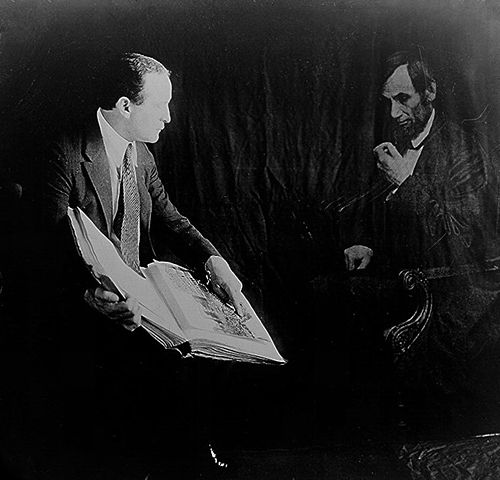oche
n. the line behind which darts players must stand
aimcrier
n. a person who cries “Aim!” to an archer; an applauder or encourager
oche
n. the line behind which darts players must stand
aimcrier
n. a person who cries “Aim!” to an archer; an applauder or encourager
From Stuart Kidd in the May 2003 Word Ways:
CANON is a synonym for ORDINANCE, and CANNON is a synonym for ORDNANCE.

transpicuous
adj. transparent
In 1922, magician Harry Price published “Cold Light on Spiritualistic Phenomena” in the Journal of the Society for Psychical Research, showing that so-called “spirit photographs” could be created using simple double exposures. In support of the exposé, Harry Houdini had himself photographed with Abraham Lincoln.

In 2004, Livermore, Calif., paid Miami artist Maria Alquilar $40,000 to create a ceramic mural outside its new library. Its pride was short-lived: The mural misspelled the names of 10 of the 175 historical figures it honored:
Nefertite
Thesues
Michaelangelo
Shakespere
Clara Schuman
Paul Gaugan
Vincent Van Gough
Albert Eistein
German chemist Otto Beckmann’s name was spelled Beckman, and Italian sculptor Luca Della Robbia’s name was spelled Luca Della Robia.
“The most egregious is Einstein,” library director Susan Gallinger told the San Francisco Chronicle. “That’s the worst one.” Livermore is home to the Lawrence Livermore National Laboratory.
Unfortunately, California state law bars the city from removing or changing public art without the creator’s consent, so the city council had to pay Alquilar an additional $6,000 to correct the errors.
The artist was unapologetic. “The people that are into humanities, and are into Blake’s concept of enlightenment, they are not looking at the words,” she told the Associated Press. “In their mind, the words register correctly.”
The Danish word for TAX is SKAT.
disbosom
v. to reveal or confess
In 2005, archivist George Redmonds discovered something surprising among English birth records of the 14th century: a girl named Diot Coke.
She was born in the West Riding of Yorkshire in 1379. Researchers at Britain’s National Archives believe that her first name is a diminutive of Dionisia and her last name a variation of Cook.
She might have done worse. Popular girls’ names of the time included Godelena, Helwise, Idony, and Avice.
Webster’s Third New International Dictionary gives no pronunciation for YHWH.

treen
adj. made of wood
German astronomer Karl Reinmuth discovered and named more than 400 asteroids. Among them are these eight:
1227 Geranium
1228 Scabiosa
1229 Tilia
1230 Riceia
1231 Auricula
1232 Cortusa
1233 Kobresia
1234 Elyna
Their initials spell G. STRACKE, for Gustav Stracke, a fellow astronomer who had asked that no planet be named after him. In this way Reinmuth could honor his colleague without contradicting his wish.